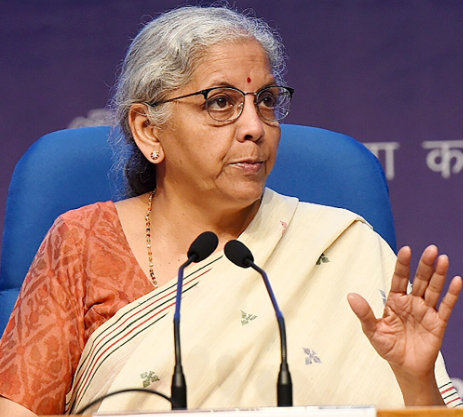Union Minister for Finance and Corporate Affairs, Ms. Nirmala Sitharaman, presented the Union Budget 2024-25 in Parliament, underscoring the resilience of the Indian economy amid global uncertainties. The budget aims to reduce the fiscal deficit to below 4.5% of GDP by FY26, with a strong emphasis on inclusive economic growth.
With India’s real growth at 8.2% and nominal growth at 9.6% in FY24, the budget highlights a robust economic performance supported by increased private consumption and substantial capital expenditure. The government projects a growth rate of 7.2% for FY25, buoyed by strong corporate and bank balance sheets. This optimism is further supported by the Reserve Bank of India (RBI).
Additionally, average retail inflation has eased to 5.4% in 2023-24 from 6.7% in the previous fiscal year, providing a favorable environment for the budget’s ambitious fiscal targets. This budget also marks the first financial blueprint of Prime Minister Narendra Modi’s government in its third consecutive term.
Fiscal Deficit and Economic Growth
In her budget presentation, Finance Minister Nirmala Sitharaman announced a revised fiscal deficit target of 4.9% of GDP for 2024-25, lower than the 5.1% projected in the interim budget.
The fiscal deficit represents the gap between government expenditure and receipts within a fiscal year. Total receipts for FY25 are estimated at US$ 383.34 billion (Rs. 32.07 trillion), while total expenditure is projected at US$ 576.26 billion (Rs. 48.21 trillion). Gross market borrowings are set at US$ 167.46 billion (Rs. 14.01 trillion), with net market borrowings at US$ 139.02 billion (Rs. 11.63 trillion).
The Centre aims to achieve a fiscal deficit of 4.5% by 2025-26, reaffirming its commitment to fiscal prudence and economic stability.
Tax Reforms and Business Growth
Continuing the government’s focus on simplifying taxes and boosting business growth, the budget includes a comprehensive review of the Income Tax Act 1961 to make it more concise and straightforward.
Key measures include merging two exemption regimes for charities, reducing the tax deducted at source (TDS) rate from 5% to 2% on various payments such as commission, brokerage, and rent, and streamlining tax processes to improve business prospects. The budget also introduces an amnesty scheme for dispute resolution, increases monetary limits for appeals, and deploys additional officers to handle appeal pendency.
Significant reforms to attract both domestic and international investors include the abolition of the Angel tax and the equalization levy of 2% on e-commerce services provided by non-residents. Corporate tax rates for foreign companies have been reduced from 40% to 35%.
Capital Gains Tax Revisions
The budget proposes substantial changes to capital gains tax provisions. These include reducing holding periods to 12 months for listed securities and 24 months for other assets, increasing short-term capital gains tax to 20%, and setting long-term capital gains tax at 12.5%. These reforms aim to simplify the tax regime and encourage investment.
Personal Taxation Adjustments
On the personal taxation front, the new tax regime may provide savings of up to US$ 209.18 (Rs. 17,500), with proposed increases in the standard deduction and family pension deduction. However, anticipated relief for salaried individuals remains limited.
While the budget advances tax simplification and investment attractiveness, its overall impact on salaried individuals will become clearer in the coming months.
Revenue and Expenditure Projections
The fiscal deficit for FY24 declined to 5.6% of GDP, with a revenue deficit of 2.6%. Key fiscal indicators for FY25 include a fiscal deficit of 4.9%, a revenue deficit of 1.8%, and Central Government debt at 56.8%. Gross market borrowings are projected at US$ 167.46 billion (Rs. 14.01 lakh crore), and net market borrowings at US$ 139.02 billion (Rs. 11.63 lakh crore).
The budget also highlights the reduction in the Gross Non-Performing Assets (GNPA) ratio of Scheduled Commercial Banks to 2.8% in March 2024. Gross Tax Revenue (GTR) is projected to grow by 11.7% over the revised estimate for 2023-24 to US$ 459 billion (Rs. 38.40 lakh crore), accounting for 11.8% of GDP. GST receipts are estimated at US$ 126.94 billion (Rs. 10.62 lakh crore) for 2024-25, reflecting an 11.0% increase over FY24. The total expenditure of the Union Government grew by 5.9% in FY24, underscoring strong tax-collection growth and continued revenue buoyancy.



